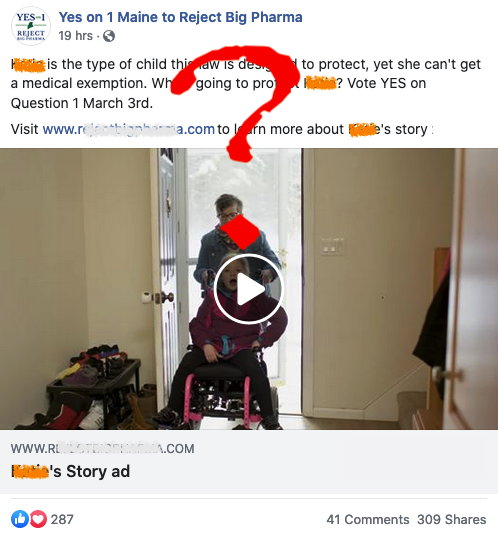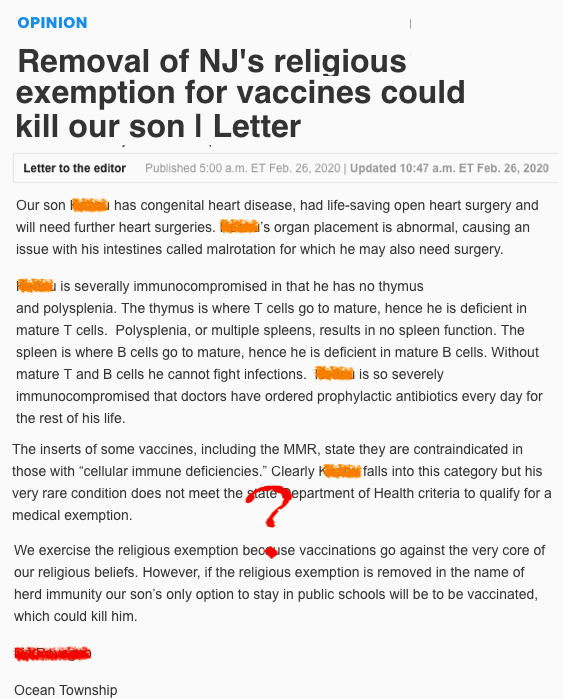It has become clear that some communities, in which clusters of unvaccinated kids have led to very low immunization levels and the return of vaccine preventable diseases, need stronger vaccine laws.

Who benefits from these stronger vaccine laws?
Who Benefits from Stronger Vaccine Laws?
It should also be clear that everyone benefits from these stronger vaccine laws except those who want to continue to send their intentionally unvaccinated kids to school.

Stronger vaccine laws that either eliminate or keep folks from abusing religious and personal belief exemptions would be of greatest benefit to those who need to hide in the herd.
"Known severe immunodeficiency (e.g., from hematologic and solid tumors, receipt of chemotherapy, congenital immunodeficiency, long-term immunosuppressive therapy or patients with HIV infection who are severely immunocompromised)"
CDC on Contraindications and Precautions
This includes those who are too young to be vaccinated or fully vaccinated, those who can't be vaccinated (true medical exemptions), and those of us whose protection has worn off (vaccines are not 100% effective).
Unfortunately, some folks are confused about what counts as a medical exemption.
A child without a thymus? They typically would not get live vaccines and would get a medical exemption.
"Children with partial DiGeorge syndrome (pDGS) should undergo immune system assessment with evaluation of lymphocyte subsets and mitogen responsiveness in order to determine whether they should be given live viral vaccines. Those with ≥500 CD3 T cells/mm3, ≥200 CD8 T cells/mm3, and normal mitogen response should receive MMR vaccine and VAR."
2013 IDSA Clinical Practice Guideline for Vaccination of the Immunocompromised Host
Some might if they didn't have a complete defect and testing showed they had sufficient T cells.
"The Infectious Diseases Society of America, in conjunction with the American Academy of Pediatrics (AAP), CDC, and other professional societies and organizations, has developed immunization guidelines for children and adults with primary and secondary immune deficiencies."
AAP on Immunization in Immunocompromised Children (Red Book)
There are also guidelines for vaccinating kids with other chronic conditions, guidelines that are sometimes abused so that kids end up getting inappropriate medical exemptions.
Does your child have seizures?
"Our results suggest that in most cases, genetic or structural defects are the underlying cause of epilepsy with onset after vaccination, including both cases with preexistent encephalopathy or benign epilepsy with good outcome. These results have significant added value in counseling of parents of children with vaccination-related first seizures, and they might help to support public faith in vaccination programs."
Verbeek et al on Etiologies for Seizures Around the Time of Vaccination
Over and over, studies have shown that vaccines do not cause seizures or epilepsy and that they are safe for kids with epilepsy.
Simply having seizures likely will not get you a medical exemption for vaccines in most states, as it is not considered a contraindication for most vaccines.
"Progressive neurologic disorder, including infantile spasms, uncontrolled epilepsy, progressive encephalopathy; defer DTaP until neurologic status clarified and stabilized"
CDC on Contraindications and Precautions
Even deferring DTaP for uncontrolled epilepsy is a precaution, not a contraindication.
"Prevention is always the best approach, so plan to get a flu shot for next year's flu season. It is recommended that all individuals with a chronic condition receive the flu vaccine!"
Epilepsy Foundation on The Flu Season: Do you need to worry about medication interactions?
And it is a temporary measure until the child's neurologic status can be clarified and stabilized.
Surprised?
You shouldn't be.
Vaccines are safe, with few risks.
And there are very few true medical reasons that kids can't be vaccinated and protected.
More on Stronger Vaccine Laws
- Vaccines While Immunosuppressed
- Is Surgery a Contraindication to Getting Vaccinated?
- Dravet Syndrome
- Will SB276 Revoke Legitimate Medical Exemptions?
- Does SB 276 Eliminate Medical Exemptions?
- Who Should Write Your Child’s Medical Exemption for Vaccines?
- Did New York’s New Vaccine Law Kick 26,000 Students Out of School?
- CDC - Contraindications and Precautions
- Recommendations for live viral and bacterial vaccines in immunodeficient patients and their close contacts
- 2013 IDSA Clinical Practice Guideline for Vaccination of the Immunocompromised Host
- Vaccinations and Immunocompromised Children
- CDC – Altered Immunocompetence Guidelines for Immunizations (ACIP)
- AAP – Immunization in Immunocompromised Children (Red Book)
- Study - Etiologies for Seizures Around the Time of Vaccination
- Study - Risk of seizures after immunization in children with epilepsy: a risk interval analysis
- CDC - Childhood Vaccines and Febrile Seizures
- Do Vaccines Cause Seizures?
- CDKL5 Disorder - A Guide for Parents
- Advancing research into the understanding and development of therapeutics for CDKL5 deficiency disorder
- Frequently Asked Questions about CDKL5 Disorder
- About Primary Immunodeficiencies DiGeorge Syndrome
- The Flu Season: Do you need to worry about medication interactions?
- A ‘no’ vote on Question 1 ensures safety of Maine’s most vulnerable
- Fight for children’s health: Vote ‘no’ on Question 1
- Maine Voices: Polio survivor urges ‘no’ vote on Question 1
- Question 1: No vote will protect our children and everyone’s health
- Vote no on Question 1. Don’t let preventable diseases make a comeback.
- No on Question 1 will save lives
- Gov. Mills: I urge Maine people to vote No on Question 1